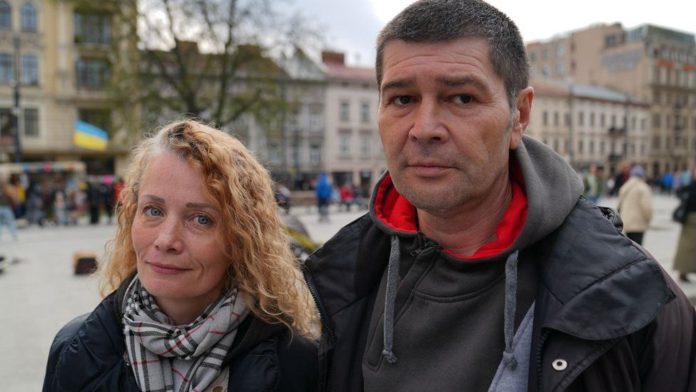With Mariupol almost under full Russian control after weeks of bombardment, those who have escaped the southern Ukrainian city share chilling accounts of being held in cramped, unclean, processing camps before being evacuated.
Oleksandr and Olena are queuing for coffee at a food kitchen just days after escaping from Mariupol.
They are two of the lucky few who managed to flee the city last week. Aside from the Ukrainian forces inside the Azovstal steel works, Mariupol is almost completely under Russian control and is effectively sealed off from the rest of the world.
Any information about the conditions inside the city for the 100,000 civilians still thought to be trapped there is sporadic and difficult to confirm independently.
The couple, who have arrived in the relatively safe western city of Lviv, tell us about surviving inside the city during the fighting. But their experience of one of Russia’s so-called filtration camps, the centres reportedly set up outside Mariupol to hold civilians before they are evacuated, is every bit as chilling.
Oleksandr and Olena say they ended up at a centre when they tried to escape the city. After walking 3km (1.9 miles) from their home to an evacuation point, they were driven to a Russian refugee hub at a former school in the village of Nikolske, north-west of Mariupol.
“It was like a true concentration camp,” Oleksandr, 49, says.
The centres have been compared by Ukrainian officials to those used during Russia’s war in Chechnya, when thousands of Chechens were brutally interrogated and many disappeared.
Oleksandr and Olena were fingerprinted, photographed from all sides, and interrogated for several hours by Russian security officers – “like in a prison”, he says. They worried that the Russians would look at their phones, and so they cleared all evidence from their devices of anything to do with Ukraine – including photos of their daughter in front of a Ukrainian flag.
They were right to worry. Oleksandr says that during their interrogation, Russian security officers examined photographs, phone call history and contact numbers on their devices for links with journalists or government and military officials.
“If a person was suspected of being a ‘Ukrainian Nazi’, they took them to Donetsk for further investigation or murder,” says Oleksandr, although the BBC has not been able to verify this claim. “It was very dangerous and risky. Any small doubt, any small resistance – and they could take you to the basements for interrogation and torture. Everybody was afraid to be taken to Donetsk.”
President Vladimir Putin has stated one of the aims of his invasion is to clear Ukraine of Nazis, and Russian propaganda has made numerous baseless allegations that Ukraine is somehow aligned with Nazism.
As they waited to be processed in a camp, some men offered Oleksandr and Olena a way to escape Mariupol without going through filtration. But the couple were terrified these could be Russians or collaborators.
“We were afraid of them,” Olena says.
Eventually they were detained and put on a list for evacuation. But the ordeal did not stop there.

